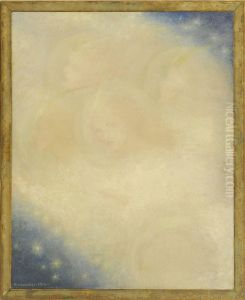Mary Lizzy Macomber Paintings
Mary Lizzy Macomber was an American painter born on August 21, 1861, in Fall River, Massachusetts. She was part of the American Symbolist movement and is known for her highly detailed, allegorical works. Macomber never married, which allowed her a level of independence that was unusual for women of her time. This independence extended into her professional life, where she pursued her artistic career with a unique vision and dedication.
Macomber studied at the Cowles Art School in Boston and later under the guidance of Robert Vonnoh and Frederic Crowninshield. She was significantly influenced by Crowninshield's appreciation for Renaissance art, which can be seen in her careful attention to detail and her methodical painting technique. Her work often featured women in dreamlike settings, surrounded by nature, and imbued with a sense of spirituality and inner life.
Her painting 'Saint Catherine' (1897) is considered one of her masterpieces and is a clear example of her Symbolist style. Macomber's work was well received in her lifetime, and she was the first woman to win the prestigious Temple Gold Medal from the Pennsylvania Academy of the Fine Arts for this painting. Despite her success, Macomber's work fell into relative obscurity after her death.
Macomber's style did not follow the trends of her contemporaries who were moving towards Modernism. Instead, her work retained a Pre-Raphaelite quality, with a focus on beauty, nature, and mysticism. She was a contemporary of artists who were breaking the molds of traditional art, but she remained true to her unique vision.
Mary Lizzy Macomber continued to paint throughout her life and became an inspiration for future generations of women artists. Her contribution to American art, particularly to Symbolism, has been reassessed and appreciated more fully in recent years. She died on February 4, 1938, in Boston, Massachusetts. Her works are held in several collections and continue to be studied for their intricate beauty and symbolic depth.

